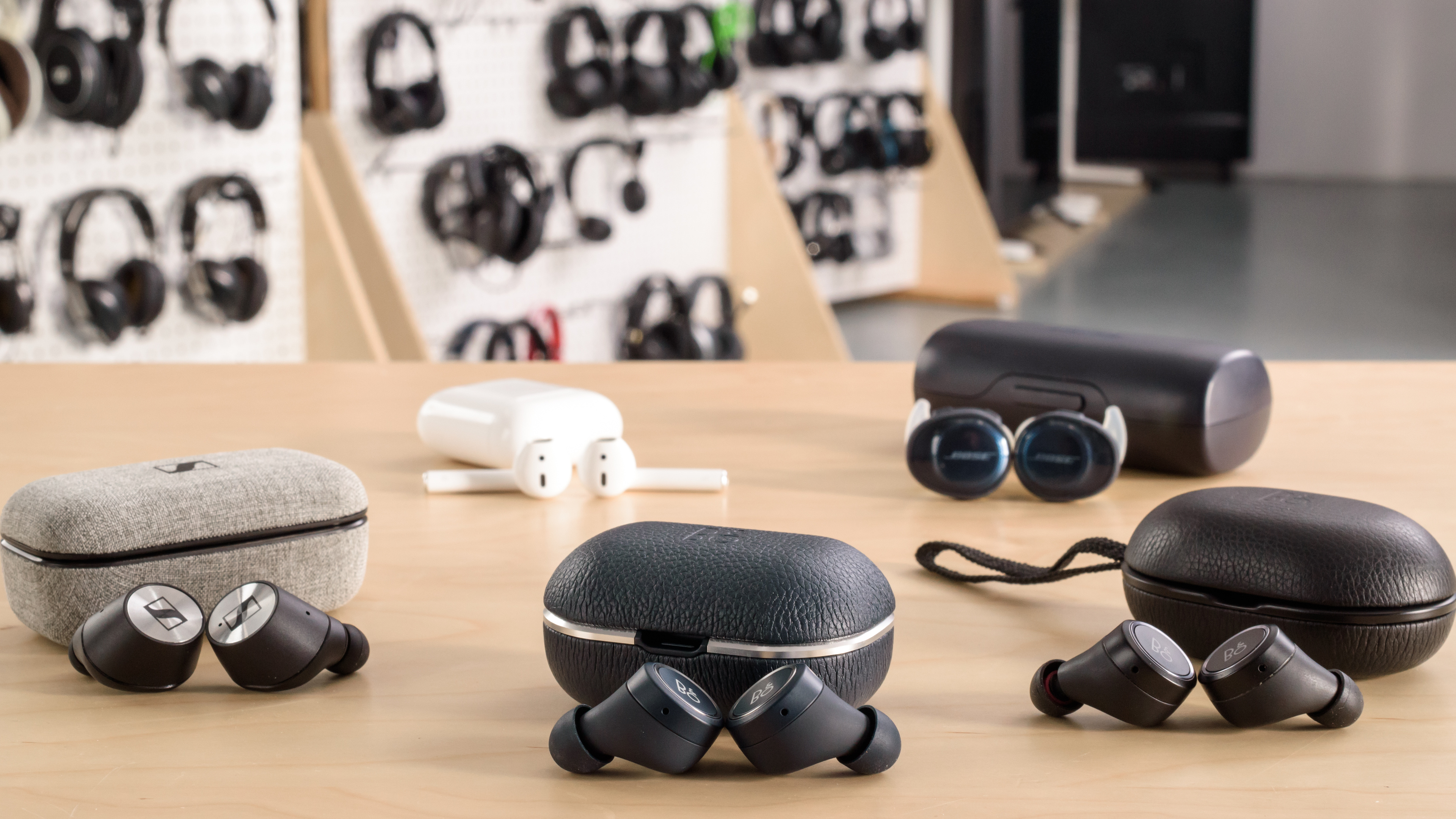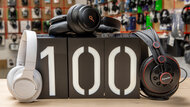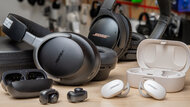The Bang & Olufsen Beoplay E8 2.0 Truly Wireless 2019 are premium truly wireless earbuds, versatile for many everyday uses. They isolate well, you can use them for commuting, and their design is suitable for sports. However, they don’t have the best audio reproduction, but it should still be okay for most people. Unfortunately, their latency is higher than the Bang & Olufsen Beoplay E8 Truly Wireless 2018, and the overall performance is pretty much the same, which means they won’t be worth the upgrade for most. On the upside, their charging case supports wireless (Qi) charging, which is the biggest difference between both models.
Our Verdict
The Bang & Olufsen Beoplay E8 2.0 are satisfactory for mixed usage. They're high-end, truly wireless earbuds that have an okay audio reproduction but great isolation performance, which is good for commuting and the office. Their design is breathable and very portable, making them a great option for sports as well. Unfortunately, like most Bluetooth headphones, they aren’t the best for watching TV due to their latency, and their microphone is sub-par and won’t be suitable for online gaming.
- Wireless charging case.
- Very good isolation performance.
- Premium build quality and comfortable design.
- High latency.
- Treble-heavy sound.
The Bang & Olufsen Beoplay E8 2.0 are okay for neutral sound. Their bass is very good, deep, and consistent. They also have a good and well-balanced mid-range. However, their bass lacks punch and body, and the mid-range is a bit muddy and thick-sounding on vocals. Their treble is also sibilant (sharp and piercing on S and T sounds), especially on already bright tracks. You can slightly EQ their sound with the ToneTouch feature in their app, but the in-ear fit might not be ideal for long listening sessions.
The Bang & Olufsen Beoplay E8 2.0 are very good for commuting. They block a lot of noise and do a surprisingly decent job at passively isolating against lower-frequency noises, like engine rumbles, making them a good option to use on the bus. Also, their truly wireless design is easy to carry around, and their battery life should last you long enough for your daily commute, but they'll more than likely need charging during long flights.
The Bang & Olufsen Beoplay E8 2.0 are great for sports. Like most truly wireless earbuds, their design is portable, breathable, and fairly stable. You won’t sweat more than usual when wearing these, and they shouldn’t pop out of your ears if you run with them. However, they don’t have an official IP rating like most sports headphones do, and some might prefer an ear-hook design or fins for added stability.
The Bang & Olufsen Beoplay E8 2.0 are decent for the office. They do a good job at isolating against noises in high frequencies like ambient chatter and A/C noises, which is great at the office. However, you can't use them continuously throughout the day as you’ll need to take a break to charge them. Also, while they’re comfortable, in-ears might not be ideal for very long periods. On the upside, they barely leak, so you won’t bother colleagues when playing audio at higher volumes.
The Bang & Olufsen Beoplay E8 2.0 aren't suitable for wireless gaming. Their latency is way too high for gaming, and their microphone performance is mediocre and isn't suited for this use. Also, they aren’t as customizable as other gaming headphones, and the in-ear fit isn’t great for long gaming sessions.
Changelog
- Updated Nov 21, 2019: Converted to Test Bench 1.3.1.
- Updated Nov 21, 2019: Converted to Test Bench 1.3.
- Updated Mar 20, 2019: Review published.
- Updated Mar 18, 2019: Our testers have started testing this product.
Check Price
Compared To Other Headphones

The Bang & Olufsen Beoplay E8 2.0 are a slight upgrade over the previous model and set themselves apart with their high-end and premium feel and their wireless charging case. However, their audio reproduction isn’t on par with some cheaper models, which is disappointing.
See at our picks for the best truly wireless earbuds, the best Bluetooth earbuds, and the best earbuds and in-ears.
The Bang & Olufsen Beoplay E8 2.0 Truly Wireless 2019 are better truly wireless headphones than the Apple AirPods (1st generation). The Bang & Olufsen have a more isolating in-ear fit that translates into a better bass range thanks to the better seal they create in your ear. The Bang & Olufsen have a customizable sound and better app support than the Apple, even on iOS devices. The Bang & Olufsen also have a better control scheme that gives you all the essential functions, while the Apple rely heavily on voice-enabled controls, which isn't always practical. The Apple have a longer cumulative battery life at 25+ hours compared to the Bang & Olufsen. The Apple have a more reliable wireless connection with greater range and better latency than the Bang & Olufsen, especially on iOS devices.
The Bang & Olufsen Beoplay E8 2.0 Truly Wireless 2019 are slightly better than the Bang & Olufsen Beoplay E8 Truly Wireless 2018 but won’t be worth the upgrade if you already have the first version. Their case now supports wireless charging, and their treble range is slightly more accurate but is still very sibilant. However, the 2.0 model now has significantly higher latency than the first. Other than that, the two models are pretty much identical.
The Bang & Olufsen Beoplay E8 2.0 Truly Wireless 2019 are better truly wireless headphones than the Bose SoundSport Free Truly Wireless. The Bang & Olufsen have a more compact and premium-looking design than the Bose. They also have a smaller case that's easier to carry around and a better control scheme, although it can be a little confusing at first. The Bang & Olufsen also have a customizable sound thanks to their app support, better isolation than the Bose due to their closed-back in-ear fit, and slightly better battery performance with a faster charge time. On the other hand, the Bose have an earbud fit that some will find more comfortable than the fit of the Bang & Olufsen. The Bose have a better-balanced sound out of the box, which may not require an EQ for most tracks.
The Sennheiser MOMENTUM True Wireless and Bang & Olufsen Beoplay E8 2.0 Truly Wireless 2019 are very similar headphones, even in design. They look and perform similarly in most of our tests. However, the Bang & Olufsen are significantly more comfortable and have slightly longer battery life, with a useful auto-off timer. The Sennheiser have a better wireless range, support lower latency codecs, and offer a better EQ.
Test Results
The Bang & Olufsen Beoplay E8 2.0 are premium-looking headphones with the same overall design as the previous model. The earbuds are slightly angled to fit nicely inside the ears and don’t protrude much. They're fairly low-profile, but you can also get them in a few color options: black, natural (all-white bud with a beige case), limestone, and indigo blue (navy blue).
The Bang & Olufsen Beoplay E8 2.0 are comfortable, truly wireless in-ears, and come with multiple tip options for you to find the best fit. They come with four different silicone tip sizes, and you also have a single foam option, which some may prefer. The earbuds are lightweight, and you barely feel them once they're in your ears. However, they have a typical in-ear design and enter your ear canal. If you find this uncomfortable, you may prefer the earbud-like fit of the Bose SoundSport Free.
The Bang & Olufsen Beoplay E8 2.0 have the same control scheme as the previous model; it has a few flaws. You can manage calls, play/pause your music, skip tracks, and even control the volume, which isn’t always available on truly wireless in-ears. You can also activate an ambient mode and trigger your device’s voice assistant. However, their different controls are a combination of multi-presses and holds, which can easily register as single tap commands like play/pause or talk-through. There are no tactile or audio prompts to confirm your registered commands, which can be slightly frustrating and takes a bit of time to learn.
Like most truly wireless headphones, the Bang & Olufsen Beoplay E8 2.0 are very breathable and don’t trap much heat inside your ears. You shouldn’t notice a temperature difference when wearing them, and they won't make you sweat more than usual if you use them when working out.
The Bang & Olufsen Beoplay E8 2.0's case is great and protects them well against physical damage, scratches, and minor water exposure. The case has a high-end feel thanks to its leather coating, and it has a brushed metallic silver finish inside it, which gives it an even sturdier and more polished look. The case is also compatible with wireless Qi chargers, which is a nice feature.
The Bang & Olufsen Beoplay E8 2.0's build quality is as great as the previous version. They're practically built the same way with dense plastic, metal, and rubber. The headphones feel well-made and should survive a few accidental drops without too much damage. They have a similar and premium build as the Sennheiser Momentum True Wireless.
The Bang & Olufsen Beoplay E8 2.0 are stable truly wireless in-ears, and you might even find a more stable fit with the different tip options provided. They don’t move much once in your ear, and you should be able to run with them without a problem. Their small design is great for the gym, and their wireless design means you won’t have to worry about a cable getting stuck on something and yanking the headphones out of your ears. However, they’re not as stable as other truly wireless headphones with ear-hooks like the JBL Endurance Peak True Wireless.
The Bang & Olufsen Beoplay E8 2.0 have fantastic frequency response consistency. If the user can achieve a proper fit and an air-tight seal using the assortment of tips that come with the headphones, they should get consistent bass and treble delivery every time they use the headphones.
The Bang & Olufsen Beoplay E8 2.0 have excellent bass accuracy. Their LFE is at 10Hz, suggesting a deep bass. However, low-bass is underemphasized by a bit more than 2dB, indicating that the thump and rumbles of EDM, hip-hop, and film scores will be balanced but slightly lacking in intensity. Mid-bass, which is occupied by the body of bass guitars and punch of kick drums, lacks by about 3dB. High-bass shows a 1dB bump that continues into the mid-range; this adds a bit of boominess to the sound. Overall, the bass is well-extended but lacks body and punch and could sound slightly boomy.
The Bang & Olufsen Beoplay E8 2.0 have impressive mid-range accuracy. The 3dB bump in low-mid, which is the continuation of the overemphasis in high-bass, makes mixes a bit muddy and cluttered and vocals a bit thick-sounding. On the upside, mid-mid and high-mid, where the upper harmonics of vocals and leads sit, are quite flat and within 1dB of our target response, which is great.
The Bang & Olufsen Beoplay E8 2.0's treble accuracy is decent. Low-treble is fairly flat, even, and follows our target curve well. However, there's a noticeable overemphasis on frequencies beyond 5kHz, which will make sibilants (S and T sounds) sharp and piercing, especially on already bright tracks. However, not everyone will hear this as intensely as others.
The Bang & Olufsen Beoplay E8 2.0 have excellent imaging. Their weighted group delay is 0.24, which is very good. The graph also shows that the entire group delay is under the audibility threshold. This ensures a tight bass and a transparent treble. Also, the L/R drivers of our test unit were decently matched but showed some mismatch in frequency and phase response, which could have a small negative effect on the coherency of the stereo image. However, it doesn’t affect the accurate placement and localization of objects (like voice and footsteps) in the stereo field. These results are only valid for our unit, and you may have a different experience.
Like most in-ears, the Bang & Olufsen Beoplay E8 2.0 have bad passive soundstage performance. This is because in-ears bypass the pinna (outer ear) and don't interact with it; activating the resonances of the pinna is one of the key factors in creating a speaker-like and out-of-head soundstage. Also, because of their closed-back design, their soundstage tends to be less open than open-back headphones.
The Bang & Olufsen Beoplay E8 2.0 have very good noise isolation performance. In the bass range, where the rumbles of airplane and bus engines sit, they achieve about 11dB of isolation, which is decent. In the mid-range, important for blocking out speech, they achieve about 21dB of noise isolation, which is very good. In the treble range, occupied by sharp S and T sounds and A/C noises, they reduce noise by 38dB, which is excellent but significantly lower than the previous generation. However, we believe this to be due to the fit and seal, and the results are still within measurement tolerance. The better fit the user gets, the better the treble isolation will be.
The Bang & Olufsen Beoplay E8 2.0 have an incredible leakage performance. A significant portion of the leakage is concentrated in a narrow band in the treble range. This results in leakage that is very thin sounding. The overall level of the leakage is very quiet. With the music at 100dB SPL, the leakage at one foot away averages at around 24dB SPL and peaks at 36dB SPL, which is way below the noise floor of most offices.
The Bang & Olufsen Beoplay E8 2.0's integrated mic has a mediocre overall performance. Speech recorded or transmitted with this microphone will sound thin and lacking in detail and presence. However, it will still be relatively easy to understand in quiet environments. In noisy situations, it struggles to separate speech from ambient noise, even in moderately loud places like a busy street.
The Bang & Olufsen Beoplay E8 2.0's mic has a recording quality. The LFE (low-frequency extension) of 339Hz suggests recorded/transmitted speech that sounds thin. The HFE (high-frequency extension) of 3.5kHz indicates speech that's understandable but lacks brightness and airiness.
The integrated microphone's noise handling is mediocre. In our SpNR test, it achieved a speech-to-noise ratio of 12dB, suggesting it's best suited for quiet environments and may struggle to separate speech from background noise in moderately loud environments.
The Bang & Olufsen Beoplay E8 2.0's battery offers about 4.5 hours of continuous playback, which isn't bad. They also have an auto-off timer to save some power if you forget to turn them off without putting them back in their case. They also take just above an hour to charge, which is better than the advertised two-hour charge time. Their charging case holds about three additional charges, and you can also use a Qi wireless charger with the case.
The Bang & Olufsen app is a nice-looking app, but it lacks a few features. You have access to the ToneTouch EQ, which acts as a quadrant EQ where you can move your selector between the warm, excited, relaxed, and bright quadrants. Since you don’t have control over specific frequencies, we don’t consider this an actual EQ since it functions more like presets. You also get an in-app player, battery information, and you can enable transparency mode.
These earbuds, like most truly wireless headphones, only connect to other devices via Bluetooth. They don’t support simultaneous multi-device pairing nor NFC. Their pairing procedure is simpler than the previous model. Now, you only have to press and hold the right earbud (instead of both) for five seconds until the LED indicator turns blue. Unfortunately, there isn't much feedback, like a distinct auditory chime, to let you know when you're in pairing mode. On the upside, they do remember the last paired device when you turn the earbuds on, so if you're not often switching between Bluetooth sources, they should be fine.
Their Bluetooth latency is quite a bit higher than the previous model's, and you might notice a delay when watching video content. However, some devices and apps offer compensation, which means you might not notice it as much.
The Bang & Olufsen Beoplay E8 2.0 don’t have an audio cable or a wired connection. If you want decent-sounding and stable in-ears with a wired connection, try the 1More Triple Driver In-Ear.
The Bang & Olufsen Beoplay E8 2.0 come with a case that acts as a charging dock and provides three additional charges for the headphones. It doesn’t have any inputs, but you can use a wireless Qi charger to power up the case, similar to the Altec Lansing True Evo, which is a nice addition to the previous generation's case. It also now supports USB-C charging, which is a nice upgrade from the micro-USB charging case of the original model.





























































































